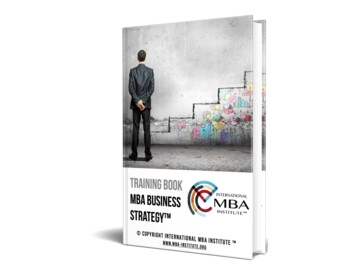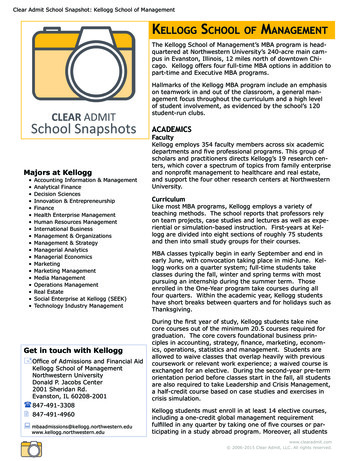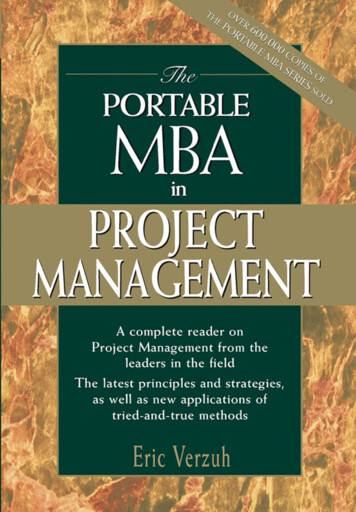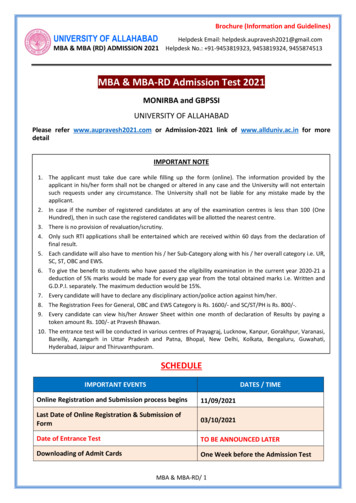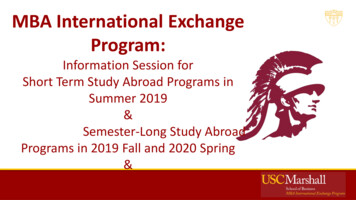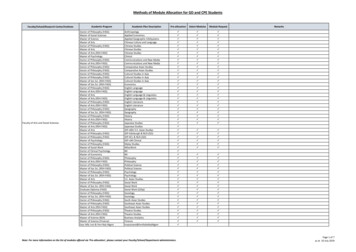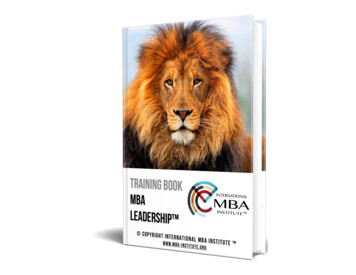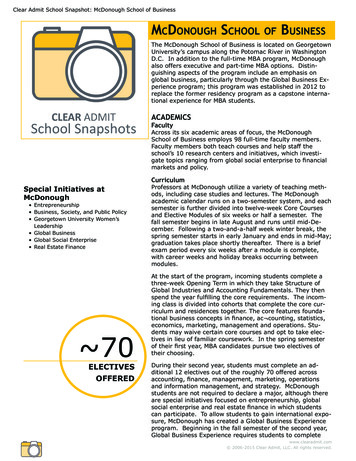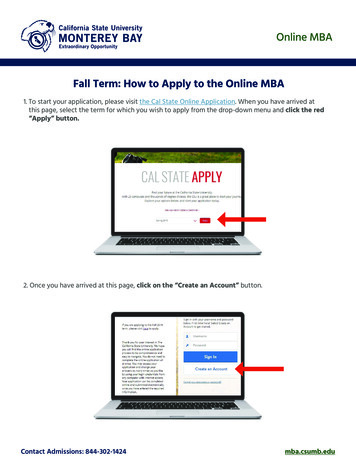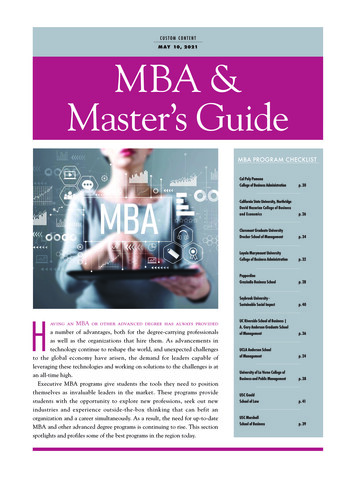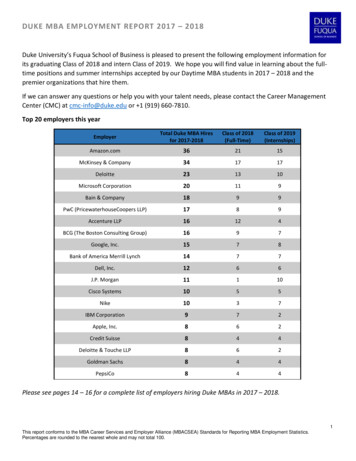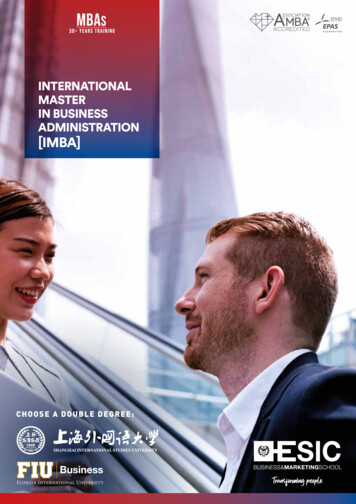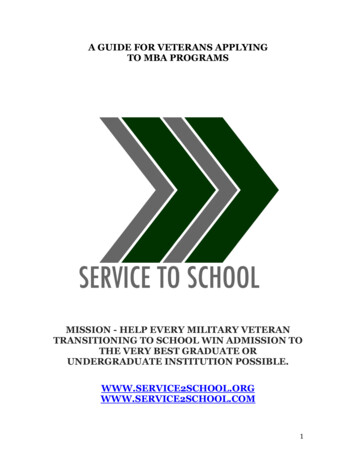
Transcription
A GUIDE FOR VETERANS APPLYINGTO MBA PROGRAMSMISSION - HELP EVERY MILITARY VETERANTRANSITIONING TO SCHOOL WIN ADMISSION TOTHE VERY BEST GRADUATE ORUNDERGRADUATE INSTITUTION COM1
TABLE OF CONTENTSSectionSubjectPage1About Service 2 School32GMAT Preparation- How to Beat the Test- Suggested Courses & Materials- Helpful Links45883Application Preparation- Resume- Essays- Letters of Recommendation9912154After Action Reviews of SuccessfulApplicants- Harvard Business School by Kim Jung- Columbia Business School by Tom Pae- Harvard Business School by Martin Peters- Wharton as a Couple by Amy Daschle17172330395aaaaaaaaaa Miscellaneous Good to Know Informationfrom S2S’s Blog- Top Mistakes Veterans Make- Thank You E-mails- Interviewing6Example Transition Timeline41aaa414446492
SECTION 1: ABOUT SERVICE 2 SCHOOLLife in the military is challenging, but transitioning after service can bethe toughest challenge of all. We help make the transition smoother byproviding free advice on the application process.Our mission is to help every military veteran transitioning toschool win admission to the very best graduate or undergraduateinstitution possible. To win you must TRAIN, so we provide:Test prep recommendationsResume assistanceApplication and essay reviewInterview prepNetwork assistanceHere are a few schools we have helped veterans win admission into: Notre Dame’s Mendoza College of BusinessHarvard Business SchoolThe Wharton SchoolColumbia’s Graduate School of BusinessMIT’s Sloan School of ManagementNYU’s Stern School of BusinessTemple’s Fox School of BusinessThe Kellogg School of ManagementStanford’s Graduate School of BusinessTexas A&M University’s Mays Business SchoolLaw school: Yale, Stanford, Vanderbilt, and HarvardService to School’s Leadership: Augusto Giacoman,Chad Burgess, Khalil Tawil, Tim Hsia3
SECTION 2: GMAT PREPARATIONWhile admissions officers stress that the entire application isimportant, it is often said that GPA and standardized test score are the mostheavily weighed factors in an application. Besides their GPA, the onlyquantitative measure of an applicant’s past performance is their GMAT score.The Importance of the TestSome State and highly ranked private schools schools place heavyemphasis on standardized test scores. However, schools at the highest andlowest ends of the ranking spectrum probably place slightly less emphasis ontest scores. The highest ranked schools are less concerned about test scoresbecause they have so many applicants with strong marks that they can acceptseveral with lower scores and still report to ranking agencies that entrants totheir schools have high marks. Also, high ranking schools usually are notcompeting with other schools for applicants because of their prestige. On thelower end of the spectrum, some for-profit institutions do not require testscores. Many advertise this in order to appeal to applicants who are eitherfrustrated by standardized tests or who feel that preparing for such tests is afruitless undertaking.That being said, practically 95% of all schools require applicants toreport their scores and ultimately place a great amount of weight on theapplicant’s score. This may seem unfair given that the test score is onlyreflective of performance over several hours. However, many schools placegreat weight on test scores because: a) they believe that hard work,preparation, and repeated practice on the test is indicative of traits they wantin their incoming class; b) a test is a standardized and quantitative ability todifferentiate applicants; c) a test allows schools to better gauge the academicabilities of an applicant who has a low GPA or who has been out of school for along time. This last reason is why test scores can be quite important fortransitioning veterans. Transitioning service-members often have been out ofschool for several years. Hence, it is crucial for veterans to ensure that theirtest score represents their true abilities.4
How to Beat the Test1) Test Prep Company or NotTest prep companies such as Princeton Review and Kaplan offer structuredenvironments that are ideal for military applicants out of school for severalyears. Test prep companies are thorough because they cover every aspect ofthe test. Some companies such as Princeton Review are known for coveringthe basics, while other test companies like Manhattan GMAT are known fortheir detailed instruction on even the most arcane and rarely tested material.More than just test coverage and analysis, the test prep companies aid militaryapplicants because they provide a structured setting. Hence, we usuallyrecommend that veterans take a prep course. While the majority of the classesoffered are in a structured classroom setting, some test prep companies offerself-paced online instruction. Also of note: many test prep companies offer amilitary discount.The downside to preparing with a test prep company is that some prepcompanies provide material that is too basic or moves too slowly over topicsthat an applicant already understands. Moreover, some transitioning veteranswho are still serving simply do not have the time to take these classes. Forthose who are busy with work, two good options are online classes or selfstudy.With self-study, studiers can move at their own pace, focus on weaknesses in acertain area, and forego paying for a test prep class. However, we are generallyskeptical of self-study because it is difficult to keep disciplined for severalmonths without getting distracted. Also, score improvement guarantiesoffered by many test prep companies are another compelling reason for vetsto use a test prep company. Should you decide to take the individual studypath, you still should rely on the test prep material provided by prepcompanies provide.2) Simulate test conditions and eliminate areas of weaknessWhether you decide to self-study or enroll in a test prep company, it is veryimportant that one balance studying with test taking. Taking numerous testswithout focusing on weaknesses is poor management of time. However,practicing on sample problems to hone overall ability can lead to a false5
security as doing so eliminates the “time stress/crunch” of test-taking undersimulated test conditions. The military stresses rehearsals and battle drills.Battle drills are analogous to simulated test taking and sample problems. Atransitioning veteran needs to do both in order to succeed. Because it is soimportant to simulate actual test conditions, it is also imperative to find andstudy questions that have been used in previous exams. While test prepcompanies often provide their own questions, the best questions are thosepreviously administered by the standardized test prep companies.Save yourself money by not taking the test if you have not yet simulated testconditions or worked through multiple problem sets. A test score will notimprove just because you have taken the actual test multiple times. However,your score will improve if you are diligently studying and preparing.3) Prepare as early as possible; use backward planningBeware of not allocating enough time to study for the test. Ideally, you willbegin to study at least a year prior to your application. . The best possiblescenario is that one has prepared for six months and takes the real test.Hopefully, the test taker is satisfied with the score but realizes that one can doeven better. The applicant continues to study and six months after taking thefirst test, one gets the score of one’s dreams. Although one and done would beideal, it is often not practical. Hence, one should not wait to take the test justdays prior to an application is due. Oftentimes this is not feasible becausemany tests do not report official scores until weeks after the test has beenadministered.4) Set GoalsWith everything in life, setting goals helps one focus on the mission. Create alist of the schools you want to gain admittance into, and see what they reportas their median test score for their latest incoming class. That is the score youshould aim to get. Applying to schools is a numbers game. Schools wantapplicants who have a proven track record and who can handle the rigorouscurriculum which students will encounter while they are attending the school.Aim to score either above or at the median test score that schools report.Ideally, one’s test score is not handicapping one’s ability to gain admittanceinto a certain school.5) Take time to rest and refit.6
One can only take time to rest if one has planned accordingly. That’s why it isreally important that one allots plenty of time for test preparation. If one hasseveral months to prepare, one can take breaks in order to avoid test fatigue.Plus, the brain needs to recover after a hard workout (test preparation). Whentaking a test, bring along a healthy snack that will help sustain your bodythrough several hours of test taking. Taking a four hour test can be a mentallyand physically draining exercise. Bring whatever snacks you prefer, however,make sure you also use these snacks during your mock tests. You don’t wantto bring a snack you’ve never had before and then have an unexpectedphysical reaction. Taking a break can also help avoid straining relationship.Test preparation can be stressful to one’s immediate family, as often it can feellike one test will determine one’s fate. Taking breaks and adding fun activitiesbetween intense study sessions will help one break away from the gravitas oftest preparation.6) Leverage online contentThere are many great websites that provide strategy and helpful hints on howto “defeat” a test. These sites also are great places to share “war stories” abouthow one did or how one is feeling. However, don’t waste too much time onthese websites. Some advice given at these websites should be taken with agrain of salt. While websites geared towards a test or graduate school can befun and entertaining, they can also include misleading statements.7
Suggested Courses & Materials1) Suggested Courses (Online and Classroom)- Manhattan GMAT- Knewton- Kaplan2) Suggested Materials- Official Guides from GMAC – They offer Official GMAT Guides and smallerVerbal and Quantitative review guides- Manhattan GMAT – They offer an eight book set that breaks down all theconcepts covered on the GMAT as well as several Computer Adaptive Tests(CATs)- Practice exams offered by GMACHelpful Links1) How to Evaluate Your Practice 011/05/23/evaluatingyour-practice-tests/2) Discounted Online Courses through GMAT Club – You can find all thecourses listed above at this tml?fl menu8
SECTION 3: APPLICATION PREPARATIONResumeIn the military, resumes were worn on your chest, recorded in yourDD214, and, for a few folks, plastered all over your truck’s rear windshield. Inthe civilian world, though, no one hands out ribbons or medals, and humanresource departments (Civilian S1’s) don’t carry a file that lists every school orcertificate you’ve ever earned (nor do they lose it after every PCS).It is critical, then, as a transitioning veteran to spend time honing yourresume. The purpose of your resume is to communicate your experience andrelevant skills to the applicable audience. That audience could be your targetschool or your target employer. Ultimately, a good resume gets your foot inthe door, meaning, if you get an interview, the school or employer isinterested in your personal background and potential because of theinformation which was listed on your resume. With our help, you can polishyour resume until it shines, but here are some helpful hints to start:1) Choose a FormatWe provide the formats we think are best on this site, but there are amultitude of formats that are acceptable. Typically, a resume comes in one ofthree formats. Most are chronological, they start in the present and work back10-15 years. An alternate format is functional, listing skills you have that areapplicable to the school or job you are applying to. Finally, there are hybridmodels that combine both.2) Keep it to One PageUnless you have recently finished your tour as Secretary of Defense,one page is all you need to have. This helps you edit down your achievementsto the most impactful events you can. While being voted President of yoursummer camp between the 11th and 12th grade is impressive, it can probablybe left off. However, don’t be shy about your achievements! Service memberscome from a team-oriented environment where the group’s achievement ismore important than individual success. You should include awards receivedand the reason you received them. Also, it is easier for someone to advise youto take something off your resume than for them to suggest you add someinformation. You are the only person who knows all of your accomplishments.Don’t sell yourself short. An additional benefit of a one-page resume is that it9
makes your resume easier to read, hand off, and carry around.3) Keep it Achievement OrientedAs a squad leader you were probably responsible for several soldiersand many thousands of dollars of equipment. You were also responsible fortaking soldiers right out of boot camp and ensuring they were ready to go towar. These responsibilities are impressive, but rather than create a bullet like“Responsible for health and welfare of nine soldiers and 10 K worth ofequipment,” you should turn that into an achievement focused bullet such as“Trained, certified combat readiness, and ensured welfare of nine soldierscapable of mission execution anywhere in the world, increasing trainingreadiness by 20%.” Evaluation reports are a great source for those who arecreating or editing their resume. Don’t forget to include achievements listed inyour most recent evaluation report.4) Start with VerbsAll of your resume bullets should start with different verbs. I heard of astory about an HR specialist who would take a sheet of paper and cover up theentire resume except for the first word of every sentence. If he wasn’timpressed with the verbs he would throw it away and the applicant would notreceive an interview. So what types of verbs are exciting? Coordinated, Led,Resourced, Synchronized, Managed, Leveraged, Spearheaded, Negotiated,Collaborated, Communicated . . . these verbs pack a punch and help yourresume to do the same. Also, always use a different verb to begin yourbullets. While managed, led, and supervised are similar, a squad leader leadsa squad, manages two team leaders, and supervises the construction of afoxhole.5) Tailor Your ResumeThis is less important for schools, but critical when it comes to jobapplications and something to keep in mind when crafting your resume. Sincethe purpose of your resume is to highlight your experience and skills and thegoal is to get you an interview, make sure that it is customized to theinstitution or employer you are applying to. For example, marketing firmsprize the ability to communicate well, so make sure that your resumeemphasizes your ability in this area. Financial firms want folks that areanalytical, again, adjust your resume to show them that you can analyze thetypes of things that they will want you to analyze. The key is to do your10
research on what skills are needed in your area, and then change your resumeto stress those key traits.A resume is a living, breathing document. Thus, you should try toupdate your resume periodically. With attention and practice it can become awork of art that lands you the interview to the school of your dreams.11
EssaysIf you are at a party where nine out of ten people are smart but also fullof themselves, would you rather hang out with the arrogant smart person orwith the ten percent of partygoers who are nice and approachable?I raise this hypothetical because this question is one that admissionsofficers encounter. Many schools get inundated with applicants who haveincredible test scores and GPAs. However, the admissions office is not aboutsimply admitting individuals who have a large prefrontal cortex. Ratheradmissions officers are often just as concerned about the potential andpersonality of the applicant. Numerous studies have shown that emotionalintelligence can be a better predictor of success than simply raw intelligence.The admissions essay is the one chance the applicant has to describethemselves and show how the person behind the uniform. The letters ofrecommendation allows admissions officers to view the applicant from theoutside in whereas the essays enable the admissions office to understand theapplicant and to view how the individual thinks and feels. The personal essaysform the basis of the applicant’s software that the admissions office plays ontheir hardware. This piece of software enables the reviewer to experience andunderstand the program and to see whether the software is entertaining,driven, or smart.Every aspect of the application is important: letters ofrecommendation, resume, standardized test score, past academicperformance, and essays. Schools use the resume, standardized test score, andpast academic performance to gauge ability. The resume and transcriptdescribe you quantitatively whereas the essay allows the applicant to describethemselves qualitatively: to discuss past experiences, goals, and who they areas a person. For military applicants, the essay is extremely important becauseit provides the applicant a chance to shatter stereotypes that people associatewith those in the military. Moreover, a good essay helps an applicant to showthat they are more than just an “egghead” and that they are an interestingperson who one would like to talk to at a party, hangout with, employ, andwant as a leader. It enables the military applicant to display his or herintangibles or soft skills.Tips for Writing a Good Essay:1) Content12
We feel foolish for mentioning this but we nonetheless feel compelledto remind applicants that when writing their essays, they need to remember toanswer the prompt (i.e. get to the point or BLUF). If the prompt says what areyour short and long term goals, then your first few sentences should probablystart with: “My short term goal is . . . My long term goal is . . .”Occasionally you will be asked a question that asks you to discuss asetback. Again, it is important that one describe a setback but when faced withthis type of question it is also important to address how one dealt with thesetback. Always first answer the question, and then seek to answer any secondor third order issues that the prompt addresses.Tell an honest and truthful story. Two parts to this advice, the first isobvious-do not embellish your story. Yes, as veterans we have –crazy, buttrue, stories to tell. Don’t be afraid to relate these crazy stories. The secondpart of the advice is to tell a good story. Your essay should not be arestatement of your resume. It is a chance to describe yourself beyond yourpast accomplishments and test scores. Provide a history of who you are andtell this personal story by providing a narrative. Avoid having your essays readlike encyclopedia entries. Try to have your essays read like a classic shortstory: a combination of intrigue, humor, suspense, and thoughtful reflection.People like to read narratives/stories as opposed to reports.Describe rather than state. For example, instead of writing that you area “hard worker” you should describe how you spent countless hours patrollingwith your soldiers and how you often staying up late to check up on yoursoldiers who were pulling guard in the middle of the night.The best essays are those that work together to provide acomprehensive overview of who you are as a person. Select certain events thathighlight pivotal moments in your life and discuss how these incidentsimpacted you. Think about the essays before you start writing. Generate 2-3responses for each prompt. Outline your responses, and generate 2-3responses for each prompt/question. Then select the response that providesthe most interesting or gripping life narrative.Try to ensure that not only do your essays embody who you are as aperson but also that the essays are synchronized with your resume andapplicant background. We highly recommend that applicants have theiressays augment (i.e. provide greater details to points in) their resume.13
2) GrammarYour writing should be succinct, fast paced, and easy to read. Avoidpassive sentences unless you deliberately intend to use a passive sentence forstylistic reasons. Proofread your essays for misspellings, grammatical errors,and for redundancy.The best way to avoid grammatical errors is to conduct several edits.We profess that we are not the best editors of our own work. Therefore, whenwe write, we often write the first draft, sleep, and then review the draft. Thisprocess lets us remain fresh and open minded when reviewing our first draft.After editing our own drafts several times we let friends and family reviewwith a fresh set of eyes and perspective to the tone and content of our essays.After they have given some feedback, we incorporate their advice, and thenreview the essays a few more times before submitting the final draft.The writing process is time consuming. Start early, outline, andcontinuously seek feedback on essay improvement.3) StyleUse powerful openers. At a party one is unlikely to engage someone in aconversation if it takes the person ten minutes to discuss somethinginteresting. Similarly, in an essay a powerful opener can capture the attentionof the reader.While writing about your military career can be interesting, sometimesthe best essays are those that shatter stereotypes. Thus, a good essay can bemore than just about a deployment. Instead, a military applicant might wantto consider writing about hobbies or interests that are unrelated to themilitary. Discussing these hobbies their intersection with a future career oroccupation can render a powerful essay.Everyone has a unique writing style. However, seek to have yourwriting be accessible. The best essays are those with a clear voice, structure,and overall theme. Avoid long sentences and paragraphs. Long sentences canbe visually unappealing and also difficult to comprehend.14
Letters of RecommendationIf there is a single aspect of the application process you have the leastcontrol over, it is the Letter(s) of Recommendation. This is where it’s up to thepeople you’ve interacted with throughout your professional career to makeyou shine in a positive light. All you can do it guide them. Therefore it’s criticalto choose the right recommenders and make the process as easy as possiblefor them.The Stanford GSB’s Admissions website says it best. When choosingrecommenders, “Choose individuals who know you well, and who will takethe time to write thorough, detailed letters with specific anecdotes andexamples. The strongest references will demonstrate your leadershippotential and personal qualities. We are impressed by what the letter saysand how it reads, not by the title of the person who writes it.”Personally, I chose individuals who’d consistently expressed an interestin my success and personal well-being – people who’d encouraged me todevelop as an individual and leader, not just as a career Army officer. In caseyou do not know already, securing a generic LoR from your DivisionCommander is not nearly as impressive as, say, a letter from your CompanyCommander, who watched you lead soldiers and nurtured your developmentas an officer. I ended up asking my former Detachment Commander (from mytime as an XO), a former Budget Division Chief (a Lieutenant Colonel andsenior supervisor I’d maintained a good relationship with), the President ofour local West Point Society (whom I serve alongside as a board member), myformer boss (2-Star Deputy CoS whom I’d been an XO for), and a fellowCaptain whom I’d worked for while working on the General’s staff (for myGSB application peer recommendation). I thought these individuals couldoffer different aspects of my leadership and professional life – from a moretraditional, tactical role (XO) to my extracurricular involvement with my almamater. If you have the luxury to bring in a diverse mix (i.e. did you coordinateany long-term projects through with ACS and have an administrator you canreach out to for a LoR?) of recommenders, I would do so. Admissions officersare looking for diversity, even among military applicants, but you’ll ultimatelyhave to use your best judgment.I approached my recommenders using a three-phase approach bymaking initial contact, presenting them with my “game plan,” and followingup. After making initial contact with my recommenders via e-mail ortelephone call and securing their support, I sent each recommender a tailoredMicrosoft Word document that included my reasons for attending businessschool, a copy of my resume, a timeline for submission, and a summary of my15
accomplishments (think event/general date) while working for/with them. Imay have gone overboard here, but chances are your recommenders are busy– and it’s been a while since you worked for them – so it’s a good idea to jogtheir memories and make coming up with anecdotes as easy as possible. Don’tbe afraid to follow up regularly with your recommenders, since they should beheld accountable for the commitment they made to you. It’s yourresponsibility to talk with them honestly about your future aspirations andcommunicate just how important your applications are to you.Being stationed overseas, it was a little difficult to follow up with someof my recommenders. I set their deadlines well before Round 1 deadlines (inearly September) and all of my recommenders – except one – missed mydeadlines by at least a few days. In the end though, all my letters ofrecommendations were received by mid-September, leaving ample time forme focus on the rest of my applications prior to submission. Again, start earlyand set early deadlines, at least a week in advance of your Round deadline.You don’t want to be frantically calling your recommenders the day before theapplication cutoff.I strongly believe that my letters of recommendation were critical inhelping me gain admission into a couple of top programs. Virtually across theboard, this year’s MBA applicants face shorter essays (for example, HBS cutdown its application from five essays to two, 400-word essays and StanfordGSB set a 1500 word limit). One can logically assume that more weight isplaced on other facets of the application, including letters of recommendationand the interview.16
SECTION 4: AFTER ACTION REVIEWS OFSUCCESSFUL APPLICANTSKim Jung, Harvard Business School, 2015You can’t do it alone. You must do it alone. These are the titles of two separatechapters in Bill Murphy Jr.’s The Intelligent Entrepreneur, which tells thestory of three MBA graduates’ entrepreneurial adventures. These seeminglycontradictory phrases highlight two important similarities between the MBAapplication process and entrepreneurship:You must rely on others. If you think that gaining admission into a top-tierMBA program is something you can accomplish alone – simply by acing theGMAT and spending hours upon hours on your essays – you’re in for asurprise. Everything from letters of recommendation to essay revision andinterview prep requires leveraging others’ experiences and support. With thatsaid You must rely on yourself. Stellar letters of recommendation and polishedessays will only get you so far. No one will spend hours studying for and takethe GMAT for you. Additionally, writing and rewriting essays, managingletters of recommendation, taking additional coursework if needed, andpreparing for interviews requires unwavering dedication. The MBAapplication process is a test of desire and perseverance. However, trust meand the long line of individuals who has gained admission into a top program:receiving an offer of admission from one of your dream schools is worth theeffort. If you’re committed to attending an MBA program, shoot for the bestprograms you have a chance at – and go all in.Below, I’ll focus on the former aspect of MBA applications and offer myreflections on the support I received from others throughout my admissionsprocess. I’ll begin with a broad overview of the help I received from Service toSchool and then delve into the topics of school selection and letters ofrecommendation – two areas where I was glad to have spent some extra timeand effort.Service to SchoolI was introduced to Tim Hsia and Gus Giacoman, co-founders of Service toSchool, by a friend of mine who was finishing his Cornell S.C. Johnson SchoolMBA program as an exchange student in Korea. He encouraged me to reachout to Tim and Gus via the Service to School website in its earlier stages. Tim17
and Gus were incredibly responsive and provided me immense help with thefollowing aspects of the application process:Resume. Tim and Gus provided me a template to use, along with a number ofsample resumes, and took a look at my draft resume. Based on their feedback,I learned that focusing on actions and results rather than roles andresponsibilities is essential to preparing a successful MBA application resume.Reaching out to school ambassadors. Tim and Gus suggested the followingadvice: speak (via phone call, Skype chat, or e-mail) with a current student inorder to get a
3 Application Preparation 9 - Resume 9 - Essays 12 4 5 aaaaaaaaaa 6 - Letters of Recommendation After Action Reviews of Successful Applicants - Harvard Business School by Kim Jung - Columbia Business School by Tom Pae - Harvard Business School by Martin Peters - Wharton as a Cou
